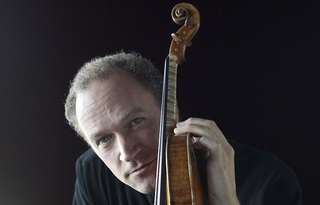|
Back
An Evening with a Superlative Leader Hong Kong
Hong Kong City Hall, Concert Hall
10/02/2009 - & October 3*
Wolfgang Amadeus Mozart: Symphony No. 41 in C major, K. 551 “Jupiter”
Robert Schumann: Violin Concerto in D minor
Pyotr Il’yich Tchaikovsky: Serenade for Strings in C major, Op.48
Hong Kong Philharmonic Orchestra, Kolja Blacher (Violin and director)

Kolja Blacher (© Prisca Ketterer)
On Friday and Saturday evenings, former Berliner Philharmoniker concertmaster Kolja Blacher demonstrated to the Hong Kong audience what the superlative leadership should be. During the concert, he led the orchestra three pieces with himself playing the violin simultaneously. It would not have been so stunning if the repertoires were Bach’s Violin Concertos or Mozart’s Serenade. All the three pieces he chose – Mozart’s last symphony, Tchaikovsky’s Serenade for a large string orchestra, and Schumann Violin Concerto in particular – usually require a conductor waving the baton. Notwithstanding, Mr. Blacher led the players with complete control, and, at the same time, played impeccably on his violin.
Mr. Blacher adopted a chamber sized orchestra, with only 8 first violins, 4 cellos and 2 double basses in the opening Jupiter Symphony. The orchestral intonation sounded exceptionally intimate, with lucid balance between different parts. Delicate articulations and polished phrasings were the most blissful features of their playing throughout. The lyrical second theme of the first movement, in which the arching melodies and exquisite articulations brought vivid contrast to the squeaky opening, was particularly enchanting. The cantabile second movement was rendered with a flowing tempo. What made Blacher’s interpretation most idiosyncratic was the use mute on all the violins throughout the movement. The inhibited dynamic range and dim intonation almost evoked the sound of a period orchestra. However, the price they paid was the over-prominent bass, especially in the dark minor section. The Menuetto was a full display of the orchestra’s bewitching dynamic contrast. The blistering pace in the last molto allegro movement brought Mozart’s trademark pleasance and delight to the surface.
Schumann’s rarely performed Violin Concerto is certainly out of HKPO’s mainstream repertoire. Mr. Blacher made a brave attempt by conducting the three-movement romantic work from his violin. But obviously his endeavor was not well rewarded. With his back facing the audience during orchestral passages, Mr. Blacher’s conducting gestures seemed eccentric and erratic. And when he turned around, he made nearly zero communication with the players. The orchestra leader Leung Kin-Fung kept staring at his score, without glancing at Mr. Blacher even at those crucial moments. The consequence, of course, was some flubbed entrances and spreading chords. This was telling exemplified at the end of the last movement, where the violin solo finished nearly one beat before the orchestra. Nonetheless, Mr. Blacher’s violin playing was consummate. Although his technique and intonation were more chamber and inward, without dazzling virtuosity that most soloists embrace, the humanistic vibrato and suave tone were enough to conquer the listeners.
After the intermission, Mr. Blacher sat back to the first deck, leading Tchaikovsky’s String Serenade from his violin. This time, he added more force to the orchestra, with 6 cellos and 5 double basses. HKPO got rid of its usual suffocating string tone and played with brightness and luster right at the opening of the first movement. The second movement was delivered with carefully polished phrases. What was retained was the waltz’s dance-like vivacity and liveliness, which set stark contrast to the introspective third movement. The whole piece ended in wonderfully felicitous inflections of dynamics and tempo. Throughout, Mr. Blacher showed commanding leadership to the orchestra, which played with precision even in the undulant slow movement.
Upon the audience’s enthusiastic applause, Mr. Blacher and the HKPO delivered the second movement of the Serenade again as an encore. It was a pity that there were too many empty seats because of the Mid-Autumn Festival. We wish Kolja Blacher can stand on the stage again!
Danny Kim-Nam Hui
|